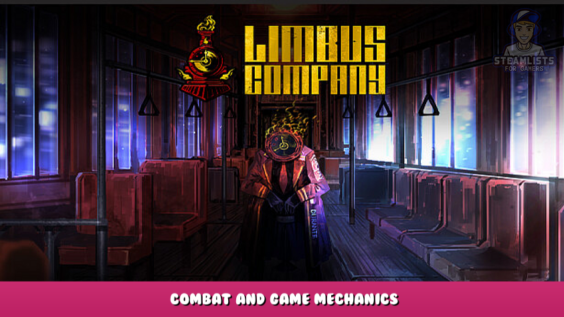
Welcome to this post We’ll discuss the Limbus Company – Combat and Game Mechanics in this post, and we sincerely hope you find it helpful.
A brief description of the different processes Limbus Company employs.
COMBAT MECHANICS
- Attack and Defense Skills:
At the beginning of the battle, there will be one column for each participating Sinner. Each passing turn adds a new column for one random Sinner, up to a maximum of 12. When a Sinner has already gained a new column, they will not receive another until all of their allies have gained one of their own. Once every Sinner has an additional column on the Dashboard , they are again eligible. Skills are randomly selected from each Sinner’s Identity Skillset and placed on the Dashboard. Used skills are treated as “discarded” until the entire Skillset has been spent, after which it will be refilled.
The first significant property of attack skills is their type:Slash, Pierce, Blunt, Evade, Guard and Counter. Secondly, there are seven “Affinities”(aka Elements in other RPGs). The Affinities include: Wrath, Lust, Sloth, Gluttony, Gloom, Pride, and Envy. To use Slash, Pierce and Blunt skills you have to link them by dragging the chain from the bottom left circle to the right one.
Depending on how skills of the same Affinity are chained, you may cause them to ‘Resonate‘. When you have 2 or more skills of the same Sin anywhere in the chain, “Resonance” will occur. Resonance boosts each skill’s damage, and those later in the chain are increased further. When you chain 3 or more skills of the same Sin in *direct* succession, “Absolute Resonance” will occur. Absolute Resonance boosts the damage of every resonating skill based on their number.
Block, Evade and Counter are referred as “Defense Skills”. Defense skills are reactive moves that play in response to enemy attacks. Unlike offensive skills, Defense skills don’t have any set targets, therefore, these particular skills won’t cause clashes unless an enemy approaches them. To use Block, Evade and Counter skills you have to click the heptagons bellow the resonance chain dashboard. Defense skills activate when under attack; multiple uses protect a unit against an equivalent number of attacks. Block activates when a unit is about to be attacked. The unit gains a shield that absorbs incoming damage with health based on the skill’s power. The shield lasts for the turn, and its health is not affected by Passives or Status Effects modifying unit health. Evaderolls an evade skill Coin for each Coin on the attacker’s skill. If the result is greater than or equal to the attacker’s, the evasion is considered a success and the opponent’s skill is nullified. After successful evasion, the skill Coin is stored for reuse. If they enemy rolls higher then you receive the full amount of damage. Counter activates after a unit has been attacked by an incoming skill and activates a Clash like a normal attack skill.
Every skill in Limbus Company consists of at least one Coin. Each skill has its “Base Power” and a “Coin Bonus”. The Base Power of a Coin is the same regardless of which side it lands on. The Coin Bonus applies when a Coin lands on Heads. Depending on the Coin’s type, this may add to or subtract from the base power value. The two types of Coins arePlus (+) and Minus (-). COIN BONUS ONLY WORKS ON HEADS, EVEN IF ITS A MINUS ONE. Skills and Coins may also have unique effects. Examine your skills and Coins before using them.
- Clashes
Clashes are a combat interaction where the power of two opposing skills is compared. It is possible to cancel the enemy’s attack in a Clash. A Clash occurs when two characters directly target each other. In regular combat, attack skills target the slots of the nearest enemy and the targeted enemy’s slot is then matched to the Sinner’s skill. Your speediest Sinners (their current speed is the value listed next to their picked skills in the battlefield) will be the first to get into a Clash with the enemies closest to your team. If your skills is almost always going to win the clash then you will see “Dominating” next to the skill icon on the Dashboard. Only use “Dominating” skills if you don’t wanna waste time thinking about clashes.
When confronting Abnormalities, Clashes will occur when a skill is set against an Abnormality’s action slot that’s targeting the Sinner. If a Sinner’s speed is higher than the slot’s, the Sinner can redirect its attack to itself.
The final power value determines the outcome of a Clash after combining all factors and bonuses. In addition, a difference in the “offense level” between opposing skills acts as a modifier. Every few points of difference in offense level add 1 to the final power value of the skill. The side with the more excellent power value wins the Clash, and 1 Coin is removed from the losing side. If both sides still have Coins to use, a subsequent Clash will occur and this process repeats until one side runs out of Coins and has their attack skill canceled. The winning side will continue attacking with their remaining Coins and gains a damage bonus based on the number of Clashes.
COMBAT MECHANICS PART II
- Passive Skills:
Depending on the Affinities of the chained skills, specific Passive abilities may activate after you used X amount of skills with Y affinity. Passives can be unlocked as your Sinners level up and each Passive skill has its Affinity threshold. Sinners in battle have Combat Passives and those not directly participating provide aid with Support Passives.
- Health and Stagger:
You will find on the health bars of both your Sinners and enemies. When an attack puts a unit’s HP below one of the yellow-lined thresholds, it will become Staggered. Staggered units cannot act and are vulnerable to all three physical attack types. The Stagger will last until the end of the next turn. What’s more, if you deplete a unit’s HP past multiple Stagger thresholds in a single turn you can further amplify the damage they take. Do note that this will not extend the duration of the Stagger.
- Resistances:
All units—allies and foes alike—have different Resistances to these Types and Affinities. The Resistances are: Fatal, Weak, Normal, Endured, and Ineffective. A weaker Resistance means more damage taken from attacks with that attribute. Conversely, a stronger Resistance reduces incoming damage.
- Sanity:
Except Abnormalities, every character in Limbus Company has a Sanity value. This number will always be within the range of -45 to +45. All the enemies your Sinners confront will have SP within these values.Every character will enter a new battle with a starting value of 0 SP. However, in Story and Mirror Dungeons, the SP of previous battles is carried over. Sanity is increased each time an enemy is defeated or a Clash is won.
Conversely, when one side’s ally dies, the entire team’s SP is impacted. Sanity will have varying effects per character each turn, all depending on its level. If one’s SP is positive, the probability of successful coinflips increases. Likewise, skill coins are more likely to yield unfavorable results if one’s SP is negative. Enemy units (again excluding Abnormalities) may fall into a state of Panic at low SP.
- EGO Skills:
E.G.O Skills are powerful moves that you can equip before each battle and they can either be Single target or AoE (Area of Effect:aka skills that target multiple enemies) attacks. EGO attacks can and will clash with enemy skills (in the case of AOE EGOs, multiple clashes occur). Each E.G.O has its own set of Resistances. Weaker values in a Sinner’s Resistances are overridden with the E.G.O’s when you use it and won’t override the Resistance values that are already stronger than its own. As powerful as E.G.O Skills are, they require certain resources to be used. Firstly, you need differing types and amounts of Affinity-based resources. When you use skills via the control panel, you will gain Affinity resources corresponding to each skill’s Sin Affinity (you can select an E.G.O Skill’s icon to check what resources you need). Additionally, E.G.O Skills use up SP (sanity points). If the Sinner’s SP is in the positives, the E.G.O will manifest correctly and attack your targeted foes. However, the closer a Sinner’s SP is to negative values the more likely they are to use an uncontrollable form of the E.G.O. At the absolute lowest level of Sanity, your Sinners will be completely out of your control. This is referred to as E.G.O Corrosion. E.G.O Corrosion renders a Sinner uncontrollable, and they may target allies as well as foes for significant damage.
- Status Effects:
Poise: on hit gain critical chance, reduced by 1 at the end of turn
Tremor: stack that raise Stagger threshold when attack by skill that Burst Tremor, reduced by 1 at the end of turn
Damage up: deal more X dmg (max 10)
Protection: take less X dmg (max 10)
Attack power up: attack skill final power +x for this turn
Attack power down: attack skill final power -x for this turn
Sin Fragility: Attacks taken by the corresponding Sin deal extra dmg (max 10 stacks)
Haste: speed + X for this turn
Bind: speed – X for this turn
Charge: resource used by others skill (max 20) reduced by 1 at the end of turn
Rupture: the next X time this unit take a hit, take Y fixed dmg
Sinking: the next X time this unit take a hit, take Y fixed Sanity dmg (Abnormalities take Gloom dmg instead)
Bleed: the next X time this unit toss attack skill coin, take Y fixed dmg
Burn: Take X dmg at the start of the round
Paralyze: Fix the power of the next X Coins to 0
For Limbus Company – Combat and Game Mechanics, see this guide. Please let us know in the comments below if you find anything incorrect or outdated, and we will attend to it as quickly as possible. I hope that today turns out well for you. Don’t forget to add us to your bookmarks if you like the post; we update the site frequently with fresh articles.
- All Limbus Company Posts List


Leave a Reply